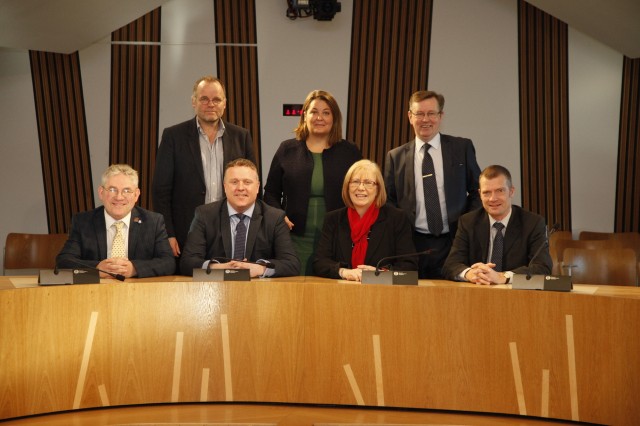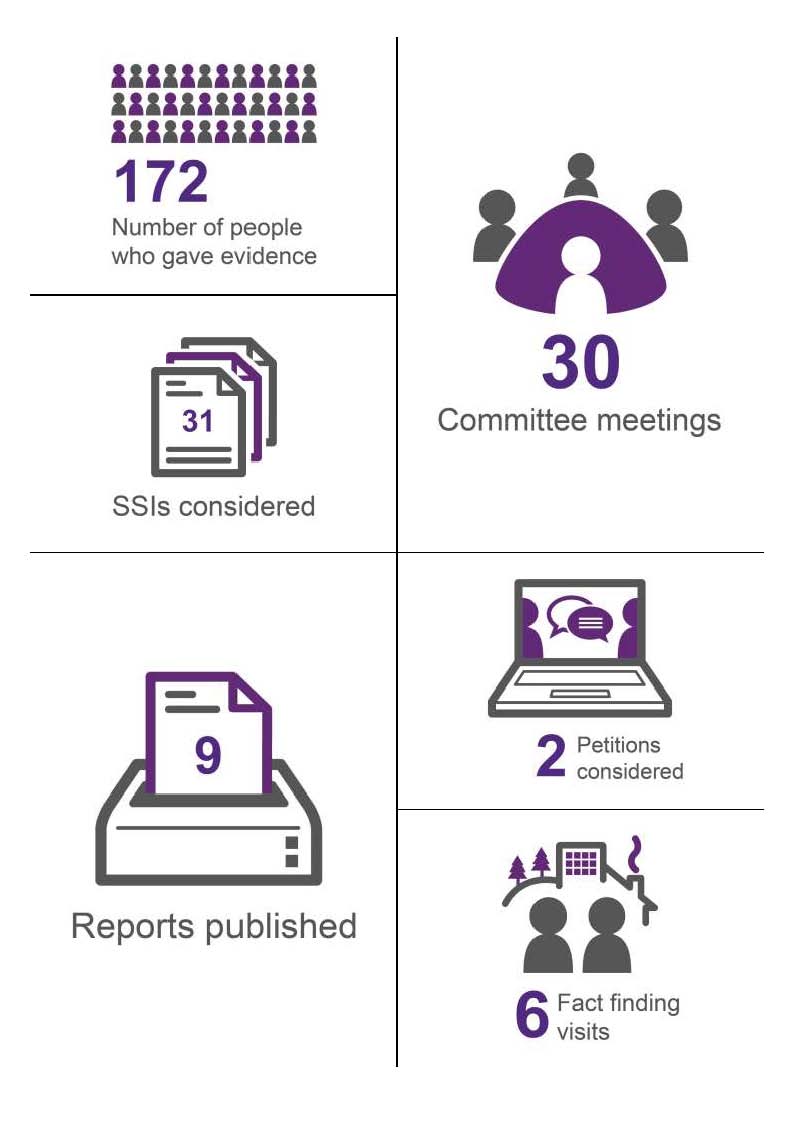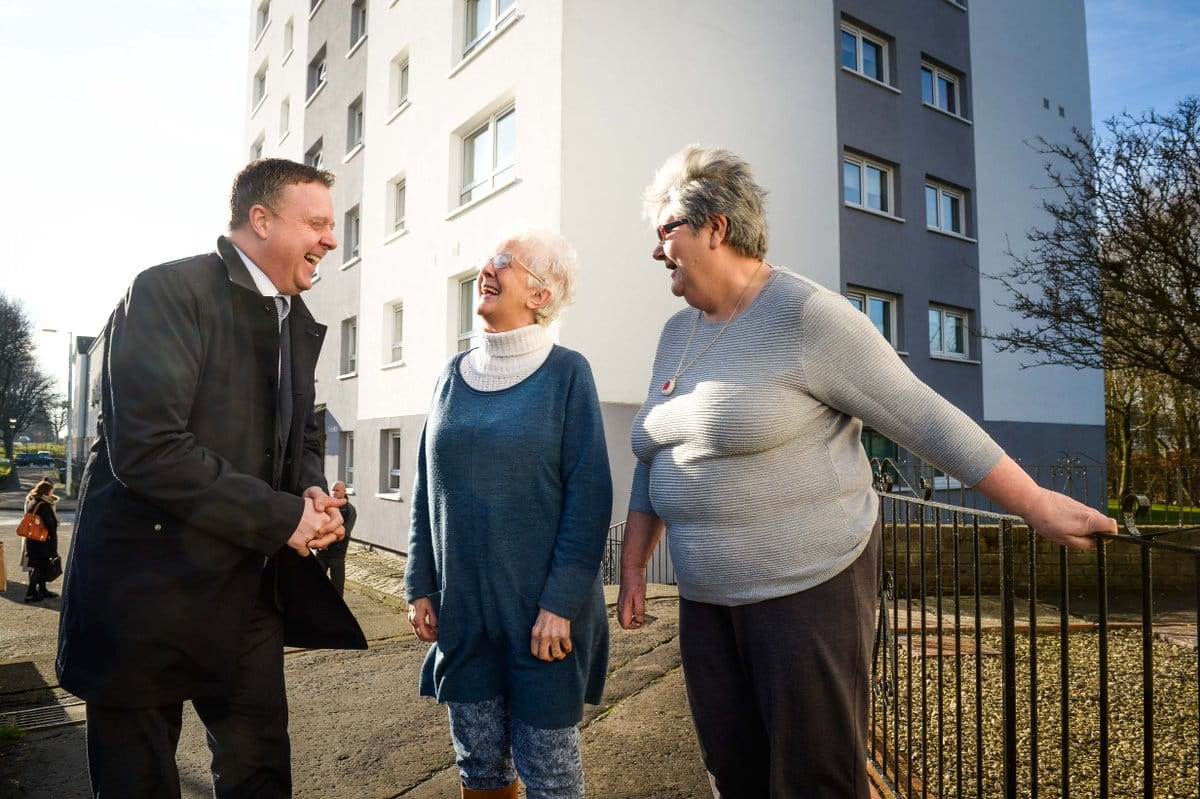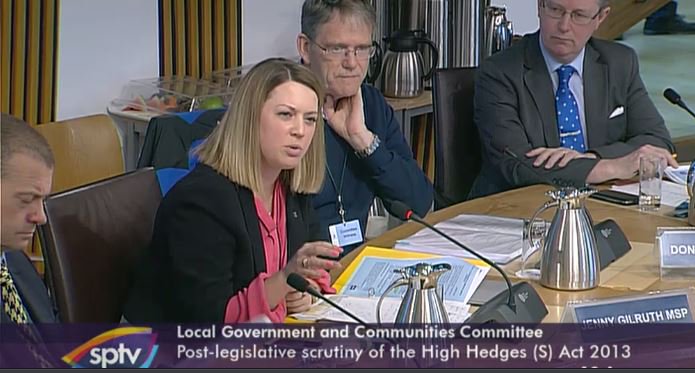Local Government and Communities Committee
Local Government and Communities Committee Annual Report 2017
Introduction
This report covers the work of the Local Government and Communities Committee during the Parliamentary year from 12 May 2016 to 11 May 2017.
Local Government and Communities Committee  Scottish Parliament
Scottish Parliament
Membership changes
Previous members of the Committee during the reporting year:
Mairi Evans (SNP) (8 June 2016 – 6 September 2016)
Ruth Maguire (SNP) (6 September 2016 – 30 March 2017)
Meetings
During the parliamentary year, the Committee met 30 times. Of these meetings 3 were wholly in private and 27 were partly in private. Most items taken in private were the consideration of draft reports and consideration of evidence heard. All meetings were held in Edinburgh.
Equalities
The Committee mainstreams equalities issues throughout its work. When inviting witnesses, the Clerks ask organisations to consider equalities issues when putting forward selected panel members.

Inquiries and Reports
Local Government Boundary Commission for Scotland's 5th Review
The Committee scrutinised the Local Government Boundary Commission for Scotland's 5th Electoral Reviews and the Scottish Government's subsequent response.
Changes to local authority arrangements came into force on 30 September 2016, and are made subject to no procedure statutory instruments and therefore the Committee is not duty-bound to scrutinise them. The Committee, however, felt that there were a number of issues raised during its consideration of the reviews which should be highlighted to Parliament and should help to inform and improve future reviews.
The Committee recommended that given new roles for the Boundary Commission in relation to Scottish Parliament constituencies and the role of the Parliament in agreeing these, it was now time to review the process for changing Local Authority Boundaries.
Scottish Local Government Elections and Voting
In advance of the Scottish local government elections in 2017, the Committee undertook some work on how voter turnout could be increased for the Scottish local government elections.
It heard from Academia, the Electoral Reform Society Scotland, the Modern Studies Association, UNISON Scotland, Shelter Scotland, MECOPP and ENABLE Scotland on how all factions of Scottish Society could be encouraged to vote. It followed up this session by hearing from the Electoral Commission Scotland, Education Scotland, the Electoral Management Board for Scotland and from an Electoral Registration Officer, followed by the Minister for Parliamentary Business.
The Committee notes that voting in local authority elections was up around 10 per cent in 2017, compared to 2012 figures.

Payment to Returning Officers in Scotland
The Committee undertook a short inquiry on payments to Returning Officers in Scotland for the conduct of elections and referendums, due to public concerns raised regarding the perceived transparency of the process, the amount of payments and the frequency of elections. In the current system, each Returning Officer (usually a Local Authority Chief Executive) can claim sums over and above their salary for undertaking the role.
Reporting in January 2017, the Committee called for the current system of payments to be stopped and to review the role and remuneration of Returning Officers in Scotland. The Scottish Government has agreed to review their role and remuneration as part of its consultation on electoral reform. However, given the announcement of the most recent General Election to take place in June 2017, the Committee wrote to the Scottish Government again in May 2017 to suggest that this work be brought forward urgently. The Committee also wrote to the UK Government highlighting its work in reference to elections it is responsible for in Scotland.
Building Regulations in Scotland
The Committee began a focussed piece of work on the building standards verification scheme, proposed rises in fees and whether the current system afforded suitable protections for home buyers. This work coincided with a review by the Scottish Government which announced that Local Authorities would be sole verifiers for building standards and not opened up to other organisations. The Committee issued a call for views and an online survey to ensure that it heard as wide a range of views as possible.
The Committee then heard privately by those who had some issues with the current process, followed by a public session with those in the building industry. The Committee will continue this inquiry into the next Parliamentary year.
Common Good Property and Funds
The Committee began a short focussed inquiry on the law in relation to common good property and funds, issuing a call for views on 8 February 2017. This inquiry will carry on into the next Parliamentary Year with oral evidence sessions.
Homelessness
The Committee agreed to hold an inquiry into homelessness, but in order to ensure that its inquiry reflected current issues causing homelessness and affecting homeless people, it undertook some initial information gathering sessions and fact-finding visits to inform the scope of the inquiry. These sessions informed the call for views which was launched on 3 May 2017. The Committee will consider its next steps following the close of the call for views on 14 June 2017.
Committee Members Andy Wightman and Alexander Stewart meeting homelessness charity CATH in Perth  Scottish Parliament
Scottish Parliament


City Region Deals
The Committee launched its call for views on City Region Deals. The remit of the inquiry is "To explore rationale, prioritisation and value for money in relation to city region deals, including the progress to date of city region deals in delivering job creation and economic growth, and the structure and governance of city region deals in Scotland."
The call for views was launched on 4 April 2017. In the next Parliamentary year, the Committee will consider its next steps upon reviewing the submissions received.
Scrutiny of Budget 2017-18
The Committee's budget scrutiny focussed on the Local Government and Housing aspects of the Scottish Government's draft budget. Given the short amount of time between the publication of the draft budget, the Local Government finance circular and when the Committee has to report, it carried out some pre-budget scrutiny, hearing from firstly, stakeholders with an interest in Local Government and Communities and then from housing stakeholders.
Some issues raised were; difficulties around the consistency and transparency of figures presented in the budget document and the Local Government finance circular; difficulties in properly scrutinising the budget in the timings available; and the importance of multi-year budgeting and outcomes based budget scrutiny. The Committee also highlighted these issues in its response to the Finance and Constitution Committee's call for views on the review of the budget scrutiny process.

Non-Domestic Rates
The Committee undertook some evidence sessions on how the current Non-Domestic Rates (NDR) system is operating and identify the range of issues which may arise as part of the Barclay Review, which is currently reviewing the NDR system in Scotland. Following concerns raised at the level of engagement with the non-commercial sectors in connection with NDR and the wider public, the Committee wrote to the Cabinet Secretary highlighting these concerns. The Cabinet Secretary confirmed that he would not recommend an extension on the deadline of the review, however he has committed to fully engaging with the Committee on scrutiny of the review's outcome.
Scrutiny of Public Bodies
The Committee is responsible for scrutinising the performance of the following public bodies:
Accounts Commission - the Committee heard from the Accounts Commission on the publication of its Local Government performance overview report.
Scottish Housing Regulator; Scottish Public Services Ombudsman and the Commissioner for Ethical Standards in Public Life in Scotland - the Committee heard from each of these bodies following the publication of their Annual Report and Accounts.
The Draft Climate Change Plan (RPP3)
The Committee was one of four Committees scrutinising the Scottish Government's draft plan setting out how it will meet its ambitious climate change targets. The Local Government and Communities Committee's focus was on Local Government, Housing, Communities and Planning. The Committees all had 60 days from the laying of the document to reporting and debating their reports in Parliament. A joint Committee debate on the plan took place in the Chamber on 15 March 2017.
Amongst other issues raised, the Committee highlighted that more emphasis could be placed on how the planning process could contribute to climate change abatement, the difficulty in scrutinising how realistic climate change housing targets were, given that most of the related policies were still being developed and a lack of focus on how the Scottish Government will drive behaviour change in communities where climate change is a lower priority. The Scottish Government will update the Parliament on the status of the final plan prior to Summer Recess 2017.




Implications for Scottish Local Government of the UK leaving the European Union
The Committee held a round-table evidence session in order to appraise itself of the key implications for Scottish local government of the United Kingdom leaving the European Union. Following the session, the Committee wrote to the Scottish Government to enquire further about the negotiation process and also to COSLA on Local Government's preparations for the implications of leaving the EU.
Legislation
Post-Legislative Scrutiny: Disabled Persons' Parking Places (Scotland) Act 2009
The Committee began its post-legislative scrutiny of the Disabled Persons' Parking Places (Scotland) Act 2009. The Committee heard from disabled people and private car park operators on their views on how the act was working in practice. This work will continue into the next parliamentary year.
Post-Legislative Scrutiny: High Hedges (Scotland) Act 2013
The Committee began its post-legislative scrutiny of the High Hedges (Scotland) Act 2013. The Committee heard from those who had applied for high hedge notices and local authorities on how the act was working in practice. This work will continue into the next parliamentary year.


Subordinate Legislation
During this parliamentary year the Committee considered 31 statutory instruments of which 26 were negative and 5 were affirmative.
Community Empowerment (Scotland) Act 2015
A package of affirmative and negative instruments were laid enacting various aspects of the Community Empowerment (Scotland) Act 2015. To inform its scrutiny, the Committee heard from Community Bodies who might wish to use the new powers and public bodies who may be affected by the legislation, prior to hearing from the Minister for Local Government and Housing.
The Council Tax (Substitution of Proportion) (Scotland) Order 2016
This order, laid on 7 September 2016, reformed Council Tax by increasing the ratios of the upper bands (E-H) relative to Band D. This means that bills for Band E will increase by 7.5%, Band F by 12.5%, Band G by 17.5% and Band H by 22.5%. No additional bands have been added and the ratios for Bands A-D remain unchanged.
The Committee held an open call for views before hearing some oral evidence sessions with academics, industry representatives, local authorities and unions, before hearing from the Cabinet Secretary for Finance and the Constitution. It published its report on 28 October 2016.
Amongst other issues raised, the Committee highlighted the need for clear and coordinated communication between the Scottish Government and Local Government regarding changes to household council tax and highlighted issues regarding the use of income earned from the increased bandings at local level to fund a national policy of educational attainment. Following the Committee's report, the Scottish Government committed to funding the educational attainment policy from central resources.
Public Petitions
Over the course of the parliamentary year the Committee considered:
PE1539 on Housing Associations to come under the Freedom of Information (Scotland) Act 2002
The Scottish Government has consulted on whether Registered Social Landlords should be brought under Freedom of Information and will publish its response in due course. The Committee has agreed to consider the petition again following that response. Should the Scottish Government option to extend coverage of FOI to Registered Social Landlords an order will be laid in the Scottish Parliament. It is that the Local Government and Communities would be lead Committee in scrutinising the order.
PE1534 on Equal rights of appeal in the planning system
The Committee agreed to close this petition at its meeting on 14 September 2016 given that it had explored the terms of the petition with the Minister for Local Government and Housing on 7 September 2016. The Minister confirmed that the issue would be taken into account during the Scottish Government's consultation on the planning system and that the petitioner would be given the opportunity to engage in workshops relating to the consultation. A planning bill is expected in the coming parliamentary year an the Committee expects to be the lead Committee in its scrutiny.
Engagement and Innovation
The Committee has endeavoured to engage directly with communities affected by its scrutiny, some examples are set out as follows:
Homelessness
The Committee visited three homelessness projects across Scotland to meet with those facing homelessness and those providing frontline service, to inform its ongoing inquiry.
Draft Climate Change Plan (RPP3)
The Committee met with people who had benefited from measures to improve the fuel efficiency of their home.
Scottish Local Government Elections and Voting
The Convener led a workshop of young voters on issues emerging from its work on Scottish Local Government Elections and Voting.
Post-legislative scrutiny of the Disabled Persons' Parking Places (Scotland) Act 2009 and High Hedges (Scotland) Act 2013
During its post-legislative scrutiny of the afore-mentioned Acts, the Committee met directly with people who had been affected by the legislation.
Building Regulations in Scotland
The Committee used a social media based survey to ensure that it could hear from as many people as possible on their experiences with building regulations. This approach proved worthwhile, returning over a thousand responses.

